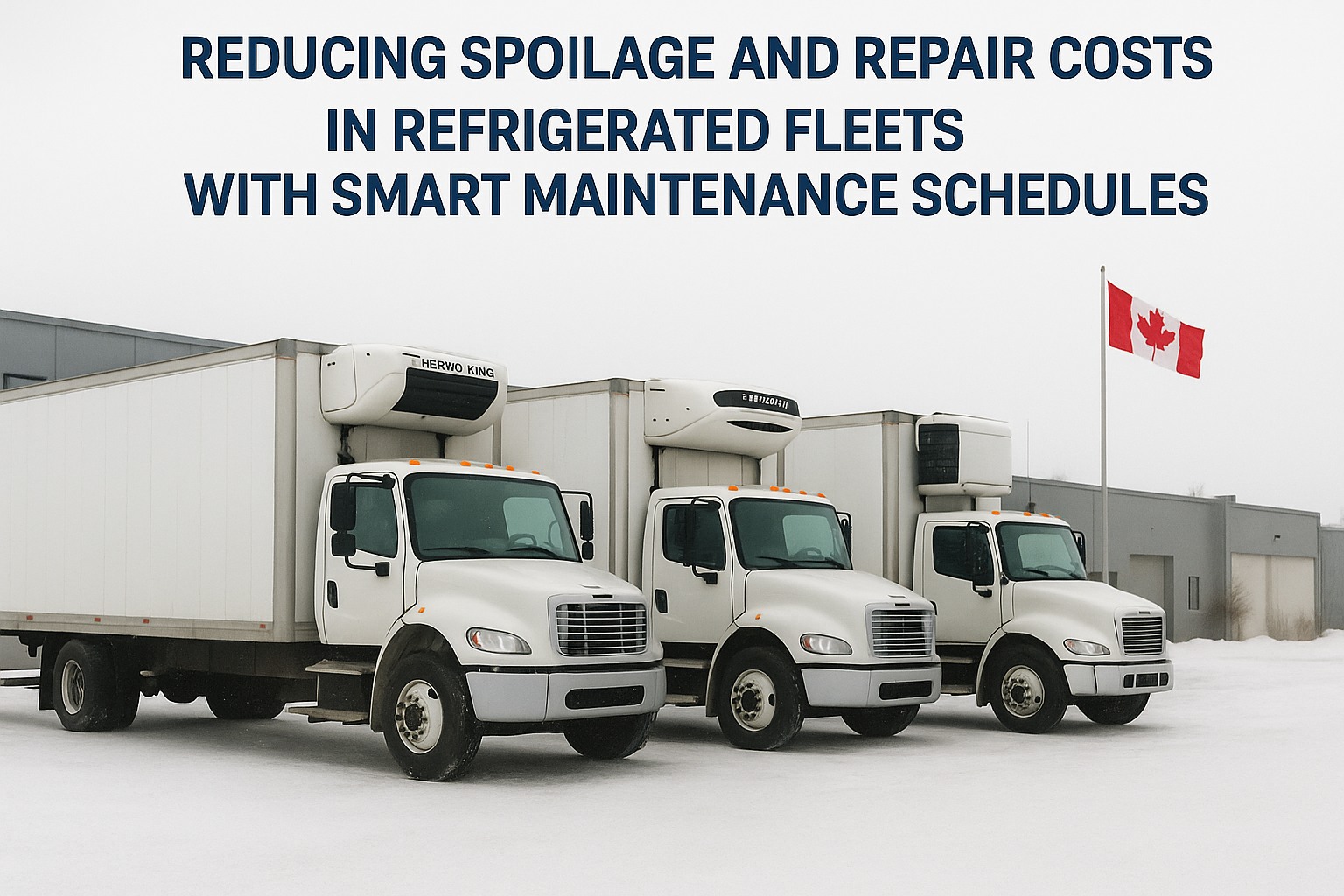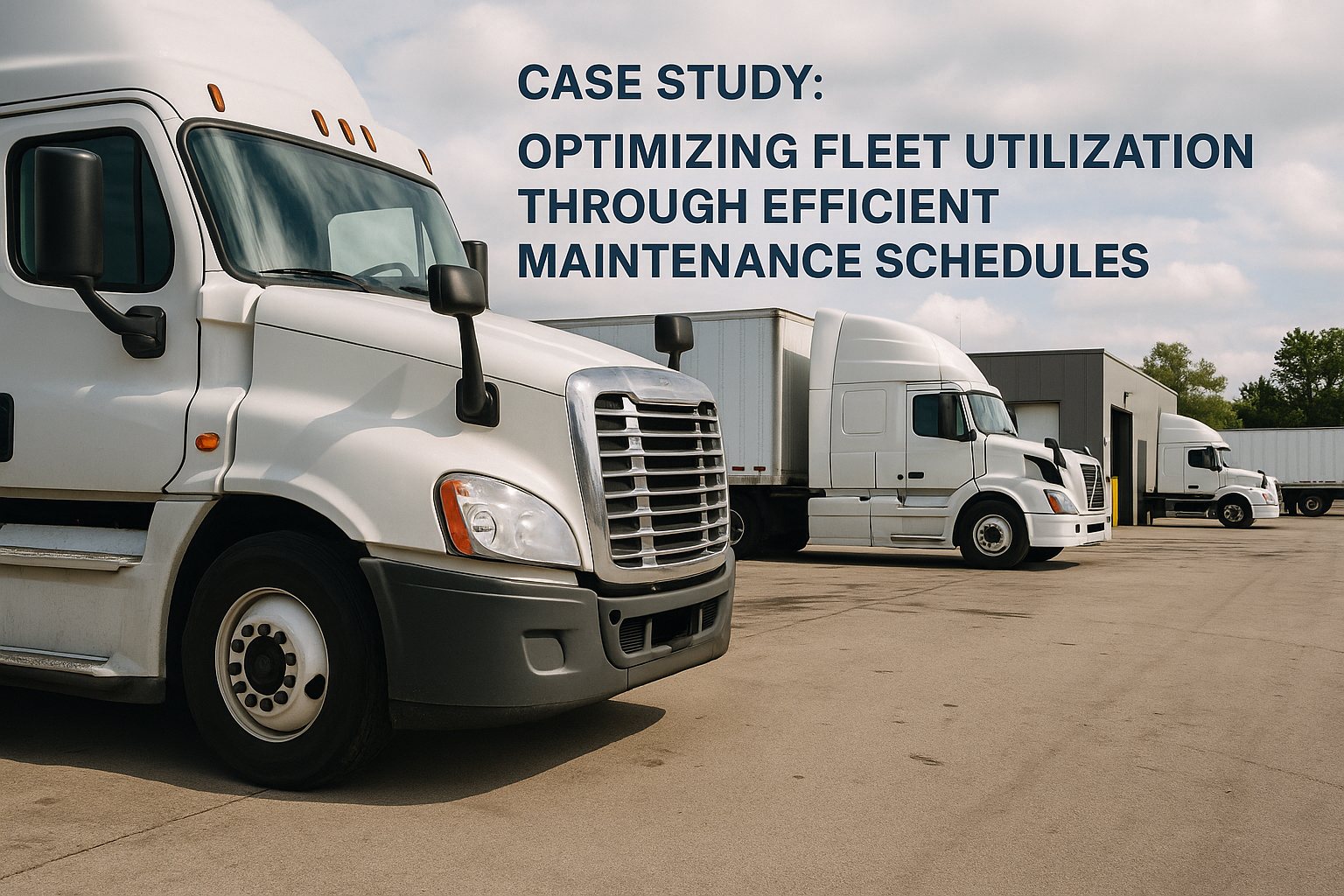Canadian refrigerated transport operators face a perfect storm of challenges: stringent CFIA regulations under the Safe Food for Canadians Regulations (SFCR), rising fuel costs, and the constant threat of temperature excursions that can destroy entire loads worth $50,000 or more. This case study examines how three major Canadian cold chain operators transformed their operations through intelligent maintenance scheduling andachieving 40% reduction in spoilage incidents, 65% decrease in emergency reefer repairs, and full CFIA compliance while improving profitability by $2.8 million annually.
The refrigerated transport industry in Canada moves over $30 billion worth of temperature-sensitive goods annually, from fresh produce crossing the border to pharmaceuticals requiring precise temperature control across vast distances. A single reefer unit failure can result in catastrophic losses—not just the immediate cargo value, but also regulatory penalties, customer relationships, and brand reputation. Traditional reactive maintenance approaches are no longer viable in this high-stakes environment.
Leading Canadian fleets are discovering that smart maintenance scheduling does more than prevent breakdowns—it creates a comprehensive cold chain integrity system. By leveraging predictive analytics, real-time temperature monitoring, and proactive maintenance protocols, these companies have transformed refrigerated transport from a high-risk necessity into a competitive advantage, all while exceeding CFIA requirements and delighting customers with 99.8% temperature compliance rates.
The Challenge: Rising Costs and Regulatory Pressure
FreshPath Logistics, operating 85 refrigerated trucks across Ontario and Quebec, faced escalating challenges that threatened their business model. With CFIA implementing stricter SFCR requirements and customers demanding real-time temperature visibility, their traditional maintenance approach was failing catastrophically.
Critical Pain Points:
- Average of 3 temperature excursions monthly resulting in $150,000 in spoiled product
- Emergency reefer repairs costing $8,500 per incident and stranding drivers for 12+ hours
- CFIA compliance violations averaging $25,000 per quarter in fines and corrective actions
- Customer churn rate of 15% due to temperature control failures
- Fuel consumption 20% higher than industry benchmarks due to poorly maintained units
- Insurance premiums increased 35% over two years due to claims history
The breaking point came during a July 2023 heat wave when five reefer units failed within 48 hours, resulting in $425,000 in spoiled pharmaceuticals and a major customer threatening to terminate their contract. CEO Maria Rodriguez knew dramatic change was needed: "We were one major failure away from bankruptcy. Our maintenance strategy was essentially hoping nothing would break."
Industry-Wide Challenges
FreshPath's struggles reflected broader industry challenges across Canada's refrigerated transport sector:
- Extreme Weather Variations: From -40°C Prairie winters to +35°C summer heat waves testing equipment limits
- Vast Distances: Routes spanning 3,000+ km with limited refrigeration service points
- Regulatory Complexity: CFIA, provincial health authorities, and cross-border FDA requirements
- Aging Infrastructure: Average reefer unit age of 7 years with declining reliability
- Skilled Labor Shortage: Qualified reefer technicians commanding premium wages when available
The Solution: Intelligent Maintenance Scheduling Platform
FreshPath partnered with FleetRabbit to implement a comprehensive refrigerated fleet management system that transformed their maintenance approach from reactive to predictive. The solution integrated real-time temperature monitoring, predictive analytics, and automated scheduling to create an intelligent maintenance ecosystem.
Core Solution Components
1. Predictive Maintenance Analytics
The system analyzes multiple data streams to predict failures before they impact operations:
- Compressor run-time patterns indicating wear
- Temperature recovery rates after door openings
- Fuel consumption anomalies suggesting inefficiency
- Vibration patterns indicating belt or bearing issues
- Defrost cycle performance degradation
2. Smart Scheduling Engine
Maintenance activities are automatically scheduled based on multiple factors:
- Predictive failure probability scores
- Route requirements and cargo sensitivity
- Technician availability and skill matching
- Parts inventory and procurement lead times
- Regulatory inspection deadlines
3. Real-Time Monitoring & Alerts
Continuous monitoring ensures immediate response to potential issues:
- Temperature readings every 60 seconds across multiple zones
- Door opening frequency and duration tracking
- Fuel consumption and engine hour monitoring
- GPS location for nearest service options
- Automated alerts with escalation protocols
Implementation Journey: 90-Day Transformation
FreshPath's implementation followed a structured approach designed for minimal disruption and rapid value realization:
Phase 1: Foundation (Days 1-30)
- Installed IoT sensors on all 85 reefer units over two weekends
- Configured temperature monitoring with CFIA-compliant logging
- Established baseline performance metrics for each unit
- Trained dispatch team on real-time monitoring dashboard
- Created emergency response protocols with automated alerts
Phase 2: Intelligence Activation (Days 31-60)
- Deployed predictive analytics engine with historical data integration
- Configured maintenance scheduling algorithms based on fleet patterns
- Established parts inventory optimization based on failure predictions
- Integrated with existing dispatch and customer notification systems
- Launched technician mobile app for field service efficiency
Phase 3: Optimization (Days 61-90)
- Fine-tuned prediction algorithms based on actual performance
- Expanded preventive maintenance scope based on early findings
- Implemented automated CFIA compliance reporting
- Created customer portal for real-time shipment visibility
- Established continuous improvement protocols
Results: Transformational Impact Across Operations
Within six months of implementation, FreshPath achieved remarkable improvements that exceeded all projections:
Operational Excellence Metrics
The smart maintenance system delivered improvements across every operational dimension:
Key Performance Improvements:
- Temperature Control: Average deviation reduced from ±2°C to ±0.3°C
- Unit Reliability: Mean time between failures increased from 45 to 180 days
- Fuel Efficiency: 18% reduction in reefer fuel consumption
- Maintenance Costs: 35% reduction through predictive intervention
- Compliance: Zero CFIA violations since implementation
- Customer Satisfaction: NPS score improved from 31 to 78
Financial Impact Analysis
The financial benefits extended far beyond direct cost savings:
- Spoilage Reduction: $1.8M saved annually in prevented product loss
- Repair Cost Savings: $425,000 reduction in emergency repair expenses
- Fuel Savings: $315,000 annual reduction in reefer fuel costs
- Insurance Premium Reduction: 20% decrease saving $180,000 annually
- New Business Growth: $2.1M in contracts won due to superior reliability
- Total Annual Impact: $4.82M in combined savings and new revenue
Best Practices for Refrigerated Fleet Maintenance
Based on FreshPath's success and similar implementations across Canada, these best practices ensure optimal results:
Critical Success Factors:
- Start with Temperature Integrity: Perfect maintenance means nothing if temperature control fails. Prioritize continuous monitoring with redundant sensors.
- Embrace Predictive Analytics: Small patterns predict big failures. Trust the data even when units appear to be running fine.
- Integrate with Operations: Maintenance scheduling must consider route requirements, cargo sensitivity, and customer delivery windows.
- Document Everything: CFIA compliance requires comprehensive records. Automate documentation to ensure nothing is missed.
- Train Continuously: Technology is only as good as the people using it. Invest in ongoing training for drivers, technicians, and dispatchers.
Seasonal Considerations for Canadian Operations
Canada's extreme weather variations require adaptive maintenance strategies:
- Winter Preparation (October-November): Intensive preventive maintenance focusing on heating systems, door seals, and battery capacity
- Summer Readiness (April-May): Compressor performance testing, refrigerant level optimization, and condenser cleaning
- Transition Periods: Increased monitoring during spring/fall when daily temperature swings stress systems
- Emergency Protocols: Pre-positioned mobile repair units along major corridors during extreme weather events
Scaling Success: From 85 to 500 Trucks
Following FreshPath's success, two other major Canadian refrigerated carriers implemented similar systems with remarkable results:
Arctic Express (Montreal-based, 220 trucks):
- Reduced spoilage incidents by 38% in first six months
- Achieved 99.9% on-time delivery for temperature-sensitive pharmaceuticals
- Won $5.2M Health Canada contract based on reliability metrics
- ROI achieved in 4.5 months
Pacific Cold Chain (Vancouver-based, 195 trucks):
- Cut emergency repair costs by 71% through predictive maintenance
- Reduced fuel consumption by 22% via optimized defrost cycles
- Expanded into high-margin pharmaceutical transport
- Customer base grew 40% due to superior reliability
Your Path to Refrigerated Fleet Excellence
The refrigerated transport industry in Canada stands at a critical juncture. Rising customer expectations, stringent CFIA regulations, and thin profit margins demand a new approach to fleet maintenance. Smart scheduling platforms offer a proven path to operational excellence, delivering measurable improvements in reliability, compliance, and profitability.
The success stories of FreshPath Logistics and their peers demonstrate that transformation is not only possible but essential for survival in today's competitive landscape. With the right technology partner and commitment to data-driven maintenance, any refrigerated fleet can achieve similar results—reducing spoilage, cutting costs, and delighting customers with unmatched reliability.
The question isn't whether to modernize your refrigerated fleet maintenance—it's whether you can afford to wait while competitors pull ahead. Every day of reactive maintenance is another day of unnecessary risk, lost revenue, and missed opportunities. The tools exist, the ROI is proven, and the path forward is clear.
Ready to Transform Your Refrigerated Fleet?
Join leading Canadian cold chain operators in revolutionizing refrigerated transport through intelligent maintenance scheduling. Reduce spoilage, ensure CFIA compliance, and maximize profitability with proven solutions.
Getting Started Book a Demo






